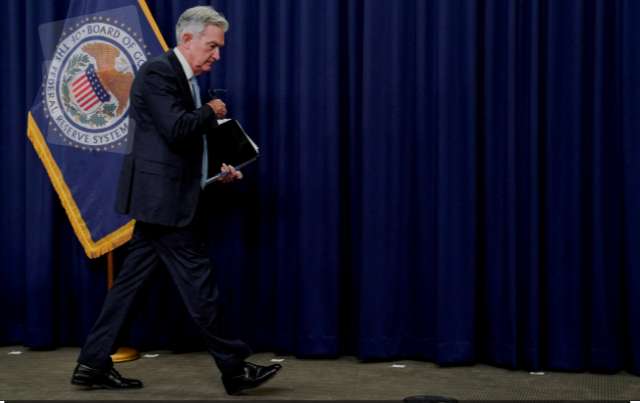How Would A 'Fed Chair Change' Impact The Market?
Uncertainty Over Fed Chair Powells Tenure Prompts Investors to Assess Potential Market Reactions to Early Leadership Change President Trump has repeatedly criticized Powell for not cutting U.S. intere

Uncertainty Over Fed Chair Powell's Tenure Prompts Investors to Assess Potential Market Reactions to Early Leadership Change
President Trump has repeatedly criticized Powell for not cutting U.S. interest rates quickly enough. He has frequently mentioned the possibility of ousting Powell before his term ends (in ten months), while also stating that firing him is "unlikely."
On Thursday, Trump said he had a "good meeting" with Powell after visiting the Fed's Washington headquarters and touring the renovation site of two historic buildings—projects the White House has criticized as excessively expensive and wasteful. He said there was no need to fire Powell.
Investors have been weighing various scenarios, including Trump firing Powell, the Fed chair resigning, or a new candidate being appointed before Powell's term officially ends. Market participants say predicting the impact of these outcomes on stocks, the dollar, and Treasury yields is highly challenging.
However, last week's brief market turmoil—when reports surfaced that Trump was considering firing Powell—offered some clues. The S&P 500 fell 0.7%, and the dollar dropped 0.9%.
Jack Ablin, Chief Investment Officer at Cresset Capital, said: "Financial markets have sent clear warning signals about the consequences of political interference."
Firing Powell
Though considered the least likely scenario, the biggest risk to markets would be Trump dismissing Powell. Such a move would be seen as an attack on Fed independence—a cornerstone of market confidence.
Based on recent volatility, Deutsche Bank strategists estimate the dollar could fall by as much as 6%, potentially its largest drop on record. The 10-year Treasury yield could rise by about 20 basis points, while the 30-year yield might surge by 45 basis points. On Thursday, the 10-year yield stood at 4.413%, and the 30-year at 4.942%.
While a new Fed chair perceived as more dovish might eventually be welcomed by markets, investors say stocks could initially plummet if Powell is fired. Ablin noted that the drop would likely exceed last week's less-than-1% decline triggered by reports of Powell's potential ouster.
David Seif, Chief Economist for Developed Markets at Nomura, warned that firing Powell would raise fears of Trump exerting greater control over the Fed. "Loss of Fed independence would lead to a very big increase, I think, in inflation uncertainty, and that would lead investors to demand much more compensation for locking their money up for that long, leading to a much steeper yield curve," he said.
Aaron Hill, Chief Analyst at FP Markets, suggested gold could benefit in such a scenario. The safe-haven metal, already near its record high of around $3,400 an ounce, might rally further.
Investors say they wouldn't distinguish between Powell being fired for one reason or another—the market impact would be similar.
Powell Resigning
If Powell resigns, concerns over Fed independence would persist, but markets might avoid prolonged uncertainty from potential legal battles. Powell has said he would refuse to step down early even if Trump asked.
Analysts say this could lead to a slightly milder short-term reaction but would confirm fears of the Fed straying from its dual mandate of maximum employment and price stability.
The Fed chair is just one of 12 voting members on the policy-setting committee. Benjamin Ford, a researcher at Macro Hive, noted: "I think that's telling you that Trump is willing to work that hard to break down the leader of the board ... that he's going to come after the rest of the board if they don't do what the new Fed chair basically does."
The dollar would be particularly vulnerable, facing pressure from both rate cuts and eroded investor confidence. Ablin added: "If the Fed appears politically submissive, it could trigger severe and lasting market upheaval across asset classes, reshaping the global financial landscape."
A Shadow Chair
The most market-friendly outcome would be Trump simply naming a successor while letting Powell serve until his term ends in May. Treasury Secretary Besant said Wednesday the administration is in no rush to nominate a replacement, suggesting an announcement could come in December or January.
Mark Hackett, Chief Market Strategist at Nationwide, said: "I don't know that the equity market would necessarily view that negatively. People are obviously going to believe that the next person is going to be more dovish on average than Powell would be, but I think that assumption is there anyway."
A chair openly favoring rate cuts could weaken the dollar. Ford said: "The transition to a new Fed chair could increasingly weigh on the dollar."
While less extreme than the other scenarios, a "shadow chair" whose policy views clash with the current leadership could create confusion. Any pick seen as Trump-influenced might inflict lasting damage to perceptions of Fed independence.
Disclaimer: The views in this article are from the original Creator and do not represent the views or position of Hawk Insight. The content of the article is for reference, communication and learning only, and does not constitute investment advice. If it involves copyright issues, please contact us for deletion.